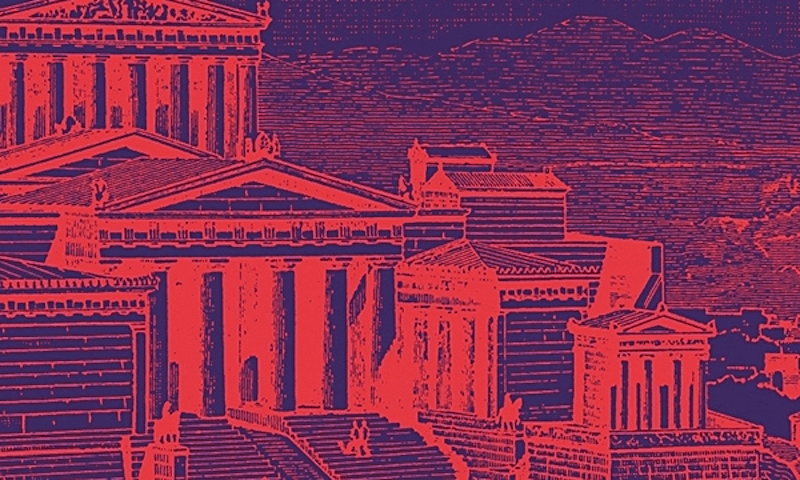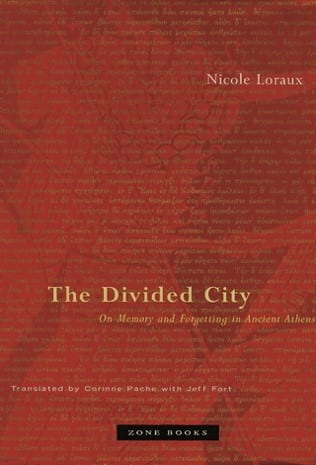By Bruce J. Krajewski
The grand theorist of civil war is Nicole Loraux. The renowned French historian of ancient Greece is for the study of civil war what Hannah Arendt is for students of totalitarianism. While no one would label Loraux a conspiracy theorist, she assumes that “there are processes that define the political in ways that escape the awareness of human societies” (84). What, then, are Americans missing about our current political troubles? Loraux, who died in 2003, ought to be a useful guide during this period after what the Financial Times called “a coup” attempted by Donald Trump at the US Capitol. One member of the mob passed through the Capitol’s rotunda shouldering a Confederate flag, providing an unmissable clue that viewers were witnessing the Civil War’s revival. Recently, the federal government sought to block one seditionist’s pretrial release based on “his fantasy of participating in another Civil War.”
Loraux’s The Divided City: On Memory and Forgetting in Ancient Athens (2002) focuses on an unfortunate kernel at the heart of democracy: polemics, agonistics, a “congenital” model of civil war (the Greek term stasis) that produces political winners and losers (97). This should sound familiar to Americans. In The Federalist, Number 10, James Madison argued that the provisions of the “American constitutions” had not “obviated the dangers” of the unfortunate kernel Madison called factions. Like Madison, Loraux posits that factions and agonistics would be a perennial problem, even when a democracy is united in a war against an external opponent. Stephanie Larson captures this feature of Loraux’s book: “[Loraux] sets stasis back into its political context, instead of considering it an offshoot of some abstract agonistic tendency in mentalité. She argues that the Greek city is intrinsically divided [my emphasis] through discourse yet at the same time reflectively offers a united model as a means of mitigating internal stasis.”
Division—it’s what irritates some about the language of Charlottesville: “fine people on both sides,” or animates some who heard Rudy Giuliani exhorting “trial by combat” before the mob moved to the Capitol on January 6. “Trial” is a reminder that the U.S. justice system functions likewise on an agonistic model which plays out “in a field of pain and death” (1601). Plaintiff versus defendant. Oppressed versus oppressor. Discord is at the heart of democracy’s identity for Loraux, who thought civil war down to its philological roots. She offers readers a “metapsychology of the city” to engage with what escapes our awareness about the political (85). Not that what happened on January 6 was a surprise. “Both sides” anticipated the current conflict. Conservative Glenn Beck claimed that Marxists who had read a book called The Coming Insurrection would “hijack” George Floyd’s death to overthrow the republic. Similarly, liberal commentators insist on their lack of surprise about an attempt to overthrow the election. The attempted coup was legible from both directions.
Civil war is a movement of ripping apart and bringing back together. Loraux says civil war (stasis) is an activity of “two halves of a whole.” The ripping apart includes murder, betrayal, sacrilege, and sacrifice. The flip side involves a strange act that Loraux locates in an ancient oath: remember to forget (42–44). Some ancient Greeks (around 400 BCE) took an oath to promise to forget the horrors of civil war, mostly to return to a place where political consensus would be possible, consensus being “the essential quality of political life” (24). This forgetting also means “denying that [civil war] is the ongoing condition” of democracy (65). For Loraux, the cycle of civil war is unalterable, but that characteristic must be repressed. The trauma caused by stasis is so profound for the Greeks that they engage in “concealing as far as possible the fact of stasis” (64). Loraux claims her project is “to estimate the effects of such an erasure in the memory of Athens” (64). It’s not a straightforward undertaking, causing her to appeal to Sigmund Freud’s commentary on repression in his “Negation” essay (65). Loraux could have leaned on Jacques Lacan to stress her point (Lacan makes an appearance in The Divided City) that the forgetting she points to will result in head-scratching. Lacan says, “Forgetting seems to be something too material, too natural, for us not to think that it goes without saying, when in fact it’s the most mysterious thing in the world as soon as memory is posited as existing” (151). By appealing to psychoanalysis, Loraux suggests readers might take the Greek’s negation of stasis as “a civic version” of a quotidian move: “I want to exclude this from myself” (65). It’s a political version of pretending “as if everything were fine” (153).
For pretend peace to return, people pledge to keep forgetting the bloodshed and hatred that ignites each cycle. Divisive discourse is replaced with talk of family, brotherhood, unity. Sentences with “always” and “never” are abandoned. Think of the social media messages to “never forget” Brian Sicknick countered by calls to “always remember” Ashli Babbitt. “Always” and “never” interfere with the polemical cycle. Those are not words for mortals. Mortals don’t participate in eternity. Call this, in Hans Blumenberg’s terms, the difference between life-time and world-time. Oddly, Loraux writes as if civil war has a sunny side. Civil war, she declares, is a “conflict that connects” (111), meaning that everyone participates in a kind of collective amnesia. Forgetting is the crucial ingredient in fashioning a reconciliation to repair political bonds. People must find homogeneity in diversity. E Pluribus Unum.
While a divided city is the model for the book Loraux considered her best, in a related essay, “War inside the Family” (1997), she revisits depictions of civil war with fathers killing their sons. Loraux’s example from Thucydides (39) might remind readers of the son who reported his father to the FBI for being an insurrectionist at the Capitol. The son had to go into hiding after his father’s arrest. Like the film When A Stranger Calls (2006), civil war is a horror that comes from inside the house. We call it domestic terrorism. Intestinal violence. For the philosopher Giorgio Agamben, Loraux’s “War inside the Family” is more important than The Divided City. “The family is simultaneously the origin of division and stasis and the paradigm of reconciliation” (7), Agamben says. As Eric D. Meyer explains, “Civil war emerges from the schismatic infighting and family feuding within the Greek household (e.g., the bitter family feud, within the House of Atreus, between Atreus and Thyestes, Agamemnon, Menelaus, and Aegisthus, et al.), and is only subsequently sublimated, within the Greek polis, by the establishment of a sovereign rule of law (the foundation of the Athenian Areopagus) which brings the self-perpetuating cycle of familial violence to a stop. With and against Loraux, Agamben argues that there is really no distinction, in Greek political theory or Greek tragedy, between the civil war in the family or in the polis.” This mixing of inside and outside, the private family home and the public realm of politics, has dire consequences. That mixture mirrors the ambiguity in the Greek term stasis, which underscores immobility, taking a stand as a citizen, but also means unrest, the kind that legitimates “every form of depravity (κακοτροπίας)” according to Thucydides.
Rebecca Comay captures the polyvalence of stasis: “The sixth century poet Alcaeus speaks of a stasis of the winds, as when a ship—a sailing vessel, a ship of state—is caught between countervailing gusts, buffeted from one side to another, marooned in constant motion, as if becalmed” (240). Stasis is the dissolution of the barrier that allows for normality, the quotidian feeling that violence is exterior, on the other side of a wall or barrier, far enough away that an army or a parent or the police can intervene before the outside threat reaches inside. Threats inside the wall generate a different caliber of fear. Culturally, that fear manifests itself in When a Stranger Calls and in The Manchurian Candidate, a film with an overt political dimension that plays up the linkage between family dynamics and international plots that use compromised insiders to exploit a state’s pre-existing factionalism. This analogy between household fury and civil war suits Loraux, who finds in The Divided City (75–77) that analogy permits encountering a question from a different angle. Appealing to Freud and Lacan (264), Loraux shows how the individual’s psyche can be read as a microcosm of the collectivity.
As an historian and classicist, Loraux saw her role as descriptive. Still, in addition to psychologists, she sought philosophers to corroborate her reflections about civil war. From Heraclitus’s “war is the father of all things,” to Kant’s famous statement that metaphysics is a “battlefield,” to Martin Heidegger’s notion that profound thinking is a battle (160–177), an influential portion of Western philosophy supplies resonance for Loraux’s commentary on civil war. Heidegger claims that Heraclitus equates war (polemos) with language (logos) and reason (68). For Heidegger, polemic is always combative and binding. He says, war “builds unity” (68). Heidegger taught his students in 1929–30 that the mission of authentic thinking is to make us “again call out to him who is able to drive terror into our Dasein [Being]” (634), a restating of the Führerprinzip. In The Divided City, Loraux gives allegiance to Heidegger’s reading of Heraclitus alone and not to his Führerprinzip, though it’s difficult to imagine that when Loraux published The Divided City in 1997 she was unaware of Heidegger’s baggage. (Victor Farias’s Heidegger et le nazismemade a splash in 1987.)
To begin thinking outside Loraux and Heidegger’s alleged cyclical prison-house of violence, Geoff Waite points to the larger context of Heraclitus’s statement: “War is father of all things, king of all, and some he shows as gods, others as men; some he makes slaves, others free” (64). Gods and men, slaves and free people. Heraclitus’s paternalistic presentation reduces humanity to a limited set of pugilistic pairs. The Loraux-Heidegger-Heraclitus political space is reserved for winners. Regrettably, Loraux and Heidegger were unable to put aside rank in their conceptualizing about a form of government without kings, a government which celebrates not rank but égalité. Did Loraux think rank persisted in modern democracies? The answer seems to be yes, judging, for instance, from the chapter “Democracy Put to the Test of the Stranger (Athens, Paris)” in Born to the Earth in which Loraux sides with Aristotle in asserting that “one cannot make a city of like elements because total homogeneity can never create a single unity” (140).
On the road to egalitarianism, human beings possess the freedom to choose options besides war, civil or otherwise. We have no need of kings or slaves, nor is the fate of democracy bound to perpetual civil war, as Karl Marx wrote of “united co-operative societies” in “The Paris Commune” section of The Civil War in France(1871). Loraux and Heidegger designate war and combat as ineradicable, programmed into democracy, business as usual. But business as usual can be rejected. Free people can elaborate new thoughts without an imposed amnesia, without sacrificing themselves to a formula that fuses Groundhog Day to civil war. This might be as difficult to imagine as a world without capitalism. In the words of Geoff Waite, “Capital and capitalism have the capacity to make the world believe and act as if their only radical alternative, communism, is not an object of possible experience” (“There is No Future in Capitalism’s Dreaming,” Arachnē, 6.2, 1999: 8). Likewise, many scholars engaged in political theory would have us believe it foolish to imagine an alternative to an endless interplay of polemics, agonistics (including “agonistic pluralism”), hatred, Schmittian duels between friends and enemies, and war. This project of limiting the political imaginary intends not to be liberatory.
Bruce J. Krajewski is a writer, translator, and editor based in Texas. He is currently working on an English translation of one of Salomo Friedlaender’s books on Kant.
Featured Image: Excerpt from the cover of Nicole Loraux, The Invention of Athens: The Funeral Oration in the Classical City (Zone Books, 2006).





